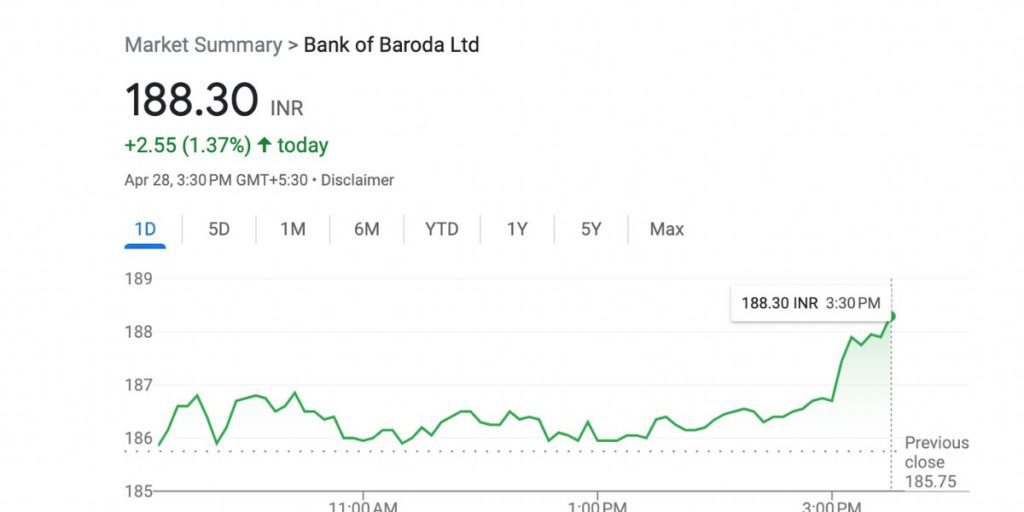Bank of Baroda share price, today, and history
Bank of Baroda is a public sector bank in India that has been operating for over 110 years. They offer numerous financial products and services to customers throughout the country, such as retail banking, corporate banking, and treasury operations. In this article, we will take a closer look at the Bank of Baroda’s share price history, its current status in the market, and its prospects.
History of Bank of Baroda
Bank of Baroda was established in 1908 in Vadodara (formerly Baroda) in Gujarat, India. Initially, the bank primarily serviced the business community in the local area and its surroundings.
Bank of Baroda has expanded its operations across India, and in 1953, it opened a branch in London, becoming the first Indian bank to do so. Today, it has a presence in over 20 countries, such as the U.S., UK, Australia, and South Africa. Recently, in 2019, Bank of Baroda merged with Dena Bank and Vijaya Bank, making it one of India’s largest banks in terms of the branch network and customer base.
Bank of Baroda Share Price History
Bank of Baroda was first listed on the Bombay Stock Exchange (BSE) and National Stock Exchange (NSE) in 1991. Since then, its share price has been subject to fluctuations, typical of the Indian stock market. During the early 2000s, the bank’s share price remained steady and ranged from INR 30 to INR 50.
In the period before the 2008 global financial crisis, the Bank of Baroda experienced a significant increase in its share price, reaching an all-time high of INR 433 in January 2008. However, the bank was not exempt from the impact of the crisis that affected numerous financial institutions globally. Consequently, its share price plummeted, reaching around INR 70 in March 2009, which represented a decline of over 80% from its peak.
Bank of Baroda’s share price made a steady recovery, reaching INR 200 per share by 2013 after the financial crisis. However, in 2015, the bank’s share price declined again due to a high-profile financial scandal related to fraudulent transactions worth over INR 6,000 crore (approximately $900 million).
Bank of Baroda’s share price experienced a significant drop to INR 130 in September 2015 due to the scandal. Although there has been some recovery since then, the share price has remained unstable in the following years.
Bank of Baroda Share Price Today
The current share price of Bank of Baroda on the BSE and NSE exchanges is approximately INR 100 per share as of April 2023. However, this value has significantly declined from its highest value of INR 433 in 2008 and is also down by more than 50% from its pre-scandal levels in 2015.
Like many other banks in India and around the world, Bank of Baroda’s share price has been impacted by a range of factors in recent years. These include:
1. Economic conditions –
In recent years, the Indian economy has encountered various challenges such as a decrease in growth, inflation hikes, and increased interest rates. These challenges affect the overall performance of banks, which in turn affects their share prices.
2. Regulatory changes –
In recent years, the Indian banking sector has experienced significant regulatory changes, such as the implementation of the Insolvency and Bankruptcy Code and the introduction of new rules about capital adequacy and liquidity. These changes can influence the financial gain and growth possibilities of banks, which can in turn impact their share prices.
HFCL Share Price, Today, and History
3. Competition –
Competition is intense in the Indian banking sector, with many public and private sector banks competing for a bigger market share. As a result, this could affect the performance and share prices of individual banks.
Bank of Baroda has managed to maintain a strong presence in the Indian banking sector and offers customers across the country a diverse range of products and services, despite facing various challenges.
Future Prospects for Bank of Baroda
Bank of Baroda will face challenges and opportunities in the Indian banking sector in the future. Factors like market trends and economic conditions will affect the bank’s prospects.
1. Digital Transformation –
The number of customers using online and mobile banking services is increasing rapidly, prompting the Indian banking sector to adopt digital technology. Bank of Baroda has also invested significantly in digital transformation initiatives to stay competitive in the coming years.
2. Growth Opportunities –
Although the Indian economy is facing challenges, there are still growth opportunities present in sectors such as retail, manufacturing, and infrastructure. Bank of Baroda, being a major and well-established player in the banking industry, is advantageously positioned to capitalize on these opportunities.
3. Regulatory Environment –
India’s banking sector will be impacted by regulatory changes related to capital adequacy, liquidity, and risk management. Bank of Baroda should stay up to date with these changes and ensure compliance with relevant regulations.
Conclusion:
To summarize, the Bank of Baroda has a prominent position in the Indian banking industry and a lengthy record of delivering financial solutions to customers throughout the nation. Although its stock price has fluctuated in the past, the bank remains a notable competitor in the market.
Bank of Baroda is well-equipped to face the upcoming challenges and opportunities in the Indian banking sector due to its robust reputation in the market and comprehensive range of products and services. The bank’s emphasis on digital transformation further strengthens its position to continue growing and flourishing in the future.







